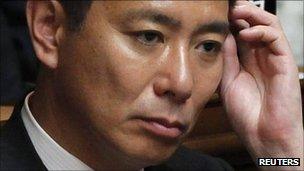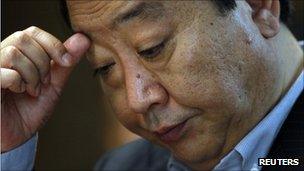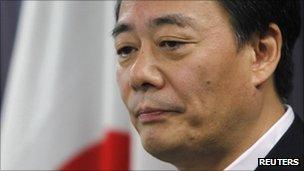Japan leadership race: Key candidates
- Published
The ruling Democratic Party of Japan is preparing to elect its new leader following Naoto Kan's decision to step down. The BBC looks at the candidates seeking to become Japan's sixth prime minister in five years.
Seiji Maehara

Mr Maehara, who resigned as foreign minister in March, is seen as having public support
The 49-year-old former foreign minister is popular with the electorate. A security expert, Mr Maehara graduated from the Matsushita Institute of Government and Management.
Mr Maehara led the DPJ for a brief period in 2005. As foreign minister under Naoto Kan, he was at the forefront of Japan's diplomatic spat with China over a collision near the disputed Senkaku islands in 2010.
He resigned as foreign minister in March after receiving an illegal $3,000 (£1,810) political donation from a foreign national - an ethnic Korean living in Japan.
If elected, he would become Japan's youngest post-war prime minister.
He has promised to focus on promoting growth instead of raising taxes to tackle the country's massive public debt.
Yoshihiko Noda

Mr Noda thinks sales tax should be increased above its current level of 5%
The 54-year-old finance minister wants to cut debt through reforms including an increase in the consumption (or sales) tax, which currently stands at 5%.
Mr Noda was the front-runner in the DPJ leadership race until Mr Maehara declared his candidacy, and shares a factional support base with the former foreign minister.
He has said his priority would be getting the Fukushima nuclear power plant under control and restoring Japan's fiscal balance.
He was elected to parliament in 1993 as a candidate for the Japan New Party, before joining the DPJ in 2000.
Banri Kaieda

Mr Kaieda has spent recent months working to end the crisis at Fukushima Daiichi power station
The 62-year-old trade minister oversees energy policy and has been closely involved in work to bring the crippled Fukushima nuclear plant under control.
In recent months he has distanced himself from Mr Kan's tough anti-nuclear power stance.
The law graduate from Keio University has been elected to parliament five times and is affiliated to former leader Yukio Hatoyama's faction.
Like Mr Noda, he was elected to parliament as a member of the Japan New Party but then joined the DPJ.
Following Mr Kan's resignation announcement, Japanese media has been rife with speculation that DPJ powerbroker Ichiro Ozawa would back Mr Kaieda.
Mr Ozawa still exerts huge influence, controlling the DPJ's biggest political faction.
Sumio Mabuchi
The 51-year-old former transport minister wants Japan to reduce its reliance on nuclear power.
He may receive support from the party's largest faction, led by DPJ heavy-weight Ichiro Ozawa.
Mr Mabuchi was first elected to parliament in 2003.
- Published8 July 2011
- Published7 July 2011
- Published2 June 2011
- Published10 May 2011